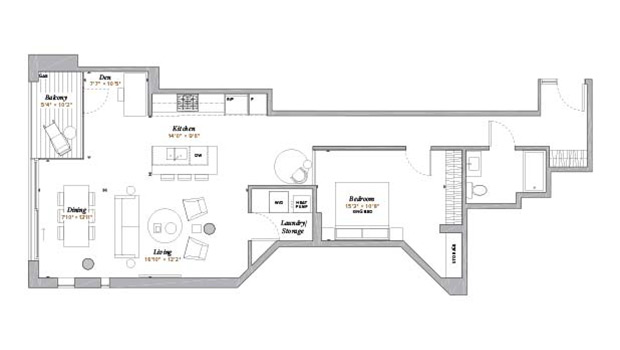In this blog I will try to explain basics of assignments, the general terms apply to any region in Canada, some specifics will be related to Ontario and more specifically GTA.
What is an assignment.
Assignment is when the seller sells the interest in the property (contract with the builder) before they actually own the property (before the seller’s name is on the title). In real estate transaction the assignments can happen for preconstruction and resale, in practise it is very rare occurrence in resale and is almost exclusively related to preconstruction. If you are familiar with equity investing think of it as selling an option, you are selling a promise to purchase and rights and obligations related as per agreement of purchase and sale.
The time period between signing the original contract with the builder and transfer of the title can be anywhere between few weeks (for an almost completed freehold in the subdivision in a slower market) to over five years for a high rise condominium, this period includes the occupancy period (when you can move in and occupy the unit but before the titles is transferred, occupancy period can last anywhere between couple of months (typical for higher floors), to over a year (typical for lower floors).
Assignor – is the seller of the contract.
Assignee – is the buyer of the contract.
Why sell an assignment.
Some investors buy the contract with the goal of cashing in the profits before the project is completed, for others simply circumstances change, they move to a different country, marriage, family got bigger, don’t want to deal with tenants, or some unfortunate events such as illness, divorce, recession or crisis, financial issues etc. force them to sell the contract.
The seller of the assignment doesn’t have to deal with closing of the transaction, occupancy, tenants, and receives cash earlier which can be deployed for other purposes.
Why buy an assignment.
The reasons for buying are multiple:
- Wanting to own a new unit without waiting many years for it to be completed as is the case with buying preconstruction.
- Depending on the progress the assignee may be able to chose the finishes.
- Avoiding risks of cancellations, most cancellations happen before the shovel is in the ground, assignments are permitted on projects almost completed.
- Assignments are usually cheaper than resale and preconstructions because they are harder to sell, the buyer usually needs to have plenty of cash available therefore there are less competing buyers. The marketing restrictions make it more difficult to find the assignments therefore further eliminating the pool of buyers, especially the type of buyers who don’t know how to look for them. The assignee will need to have enough money to pay for the initial deposit the assignor paid to the builder, profit of the assignor, HST, development charges etc. For a typical DT Toronto condo we are looking at amounts around $200,000 or more.
- To take advantage of people who can’t close on their preconstruction and score a good deal.
Permission to assign.
The original contract signed with the builder must have a clause allowing assignments, if the there is no clause in the original contract you will not be allowed to assign. Most builders allow assignments but don’t assume, after you have confirmed the assignments are permitted, the seller (or it’s representative) should send a formal request for consent to assign to the builder. The formal request to the builder should be send after the deal is firm (not to lose the assignment fee), and the assignment contract should be conditional on the builder approval. Each builder has specific requirements for assignments (specific forms, criteria’s, fees, restrictions), have your lawyer make sure everything is done properly so your and your money are protected. Typical assignments restrictions/requirements will be:
- Allowed for projects mostly completed
- Not allowed to be listed on MLS
- Receipt of assignment fee
- Most or all units are sold
Assignment fees.
If your contract with the builder allows assignments, there will likely be a provision for the assignment fee payable to the builder (there are some exceptions without fees for assignments), on occasion the builder will offer a waiver of assignment fee as one of the incentives to buy. Typically, the assignment’s fees with range between $1,000 to $5,000, and in most instances the fee is paid by the original buyer.
How to find or sell the assignments.
The developers often put marketing restrictions on the sale of assignments and that is why very few are advertised on MLS. If you are thinking of selling the assignment please read the contract carefully for the restrictions, you don’t want to breach the contract. The assignments can often be found on sites such as kijii, closed facebook groups for realtors, the realtors find them through their own connections.
Closing of an assignment.
The closing of an assignment transaction is between the assignor (seller of the contract) and the assignee (buyer of the contract). The contracts can be structured in various ways but typically the seller of the contract will receive the deposit they paid to the builder plus any profit (difference between the purchase price from the builder and selling price of the assignment). If there is a loss the amount will be reduced.
The closing of an assignment happens prior to title transfer from the builder to the assignee, in essence the assignee is involved in two transaction (assignment, and later on the purchase from the builder), and will pay legal fees for both transactions.
Financing of the assignment.
Most lenders do not finance the assignments, they finance on closing (title transfer).
The original buyer (seller of the contract) wants to received as much money as possible as soon as possible, the buyer of the contract wants to pay as little as possible and as late as possible. If the new buyer doesn’t have enough funds available to cover the profits of the original buyer, the deal can be structured is such a way that the profits (or parts of them) are transferred to the original buyer upon closing when financing is available from the lender. Each deal is different, the seller must remember that the closing may not happen until the title is transferred which may be a significant amount of time.
The final financing will obviously be based on the assignment price, not on the original purchase price, the assignment offer should include financing condition, and the buyer should deal with a mortgage broker familiar with assignments.
Incentives cancelation as a condition of assignment.
There have been cases where the builder is insisting on removing the previously received incentives (capping of development charges, design and upgrade credits, or other incentives given at the time of the purchase) which can add up to thousands. This is a very troublesome outcome for both the sellers and the buyers, makes it more difficult to sell the assignment, and more costly to the buyer. I suggest both the seller and the buyer have clauses or conditions in the offer protecting their interest (speak to a lawyer familiar with assignment sales). A buyer would want the offer conditional on the fact that no incentive changes are made due to the assignment sale, if you are the seller you would want to include a condition stating that the buyer agrees to pay for any costs related to incentives if this occurs on closing.
If you are a seller you would want this issue to be clarified by your lawyer at the time of signing the original agreement of purchase and sale from the builder, have your lawyer insert a proper clause protecting you in that regard during the 10 day cooling off period.
Interest on deposits.
The interest the builder pays on deposits is typically received by the new buyer, but this can be negotiated as part of the assignment agreement. Typically the amounts are fairly insignificant.
Original APS (Agreement of Purchase and Sale) review condition.
If you are a buyer make sure you have a condition in the offer stating that the purchase is conditional on the lawyer’s review of the original Agreement of Purchase and Sale.
Progress report condition.
The seller should insist on the progress report condition, once the contract is assigned to the new buyer the builder will only be dealing with the new buyer, it is important for the seller of the contract to be aware of the progress especially if the seller is owed money.
Risks associated with assignments.
Buyer – when buying an assignment, the assignee takes on all terms and conditions of the original APS, it is very important that a competent lawyer reviews the original agreement of purchase and sale (have a clause in the contract allowing for lawyer’s review). Delays, which are very common occurrence, are another risk absorbed by the buyer. Probably the biggest risk of for the buyer of the assignments are project cancelations and as recently has happened in few instanced builder threatening to cancel the deal unless the buyer comes up with a extra money.
Seller – if the buyer of the assignment is not able to close on the deal, the developer may hold the assignor responsible, but at the same time it doesn’t necessarily mean that the builder will allow the original purchaser to close the deal.
The builder will stop communicating with the assignor and all correspondence will be sent to the assignee, that’s why the seller should insist on progress report condition in the assignment agreement of purchase and sale.
Costs associated with selling assignments.
Typically the same real estate commissions apply to assignment sale as it would with resale, legal fees are a bit higher for assignments than for resale. Closing costs such as development charges, Tarion fees, levies, utility hookups etc. are paid by the assignee.
Occupancy fees.
Once the assignment agreement is signed usually the assignee is responsible for the occupancy costs.
Land Transfer Tax.
Land transfer tax is paid at the time of closing (title transfer) by the assignee on the value of the assignment. If the original APS was $500,000 and it was subsequently assigned for $750,000, the land transfer tax will be based on $750,000 and not the original purchase price of $500,000.
HST on assignment.
I encourage you to contact the tax expert for advice, and read the CRA folio, the folio provides number of different examples.
EDIT: the following paragraphs will not be applicable as of January 1, 2023.
The initial intent when purchasing the right to purchase the property is crucial when determining the HST aspect of the assignment.
If the intention of the original purchaser was to occupy the property as a principal residence (and the facts support it), the purchaser is not considered to have acquired the interest in the property for the primary purpose of selling, therefore they are not considered builders of the new property, and the sale of their interest in the property is tax exempt.
When the property was purchased with the intent of selling it for profit, the assignment sale triggers sales tax consequences.
In the folio linked above CRA states that for the assignment sale the HST is payable on the amount of the deposit and the profit of the original owner, the sample provided states that if the amount paid to the original purchaser was $15,000 (which includes $10,000 deposit), the HST is payable on the full amount. Apparently, this position has been successfully challenged and the buyers were allowed to pay HST only on the profit portion, and not the deposit amount. Please consult the tax specialist.
EDIT: the following treatment of HST will be applicable as of January 1, 2023.
As a result of changes made in Budget 2022, a sale made by an individual of a residential condominium or single unit residential complex by way of assignment is taxable for GST/HST, regardless of the reason for the acquisition of the property.
Taxes on profit.
When you sell an assignment the most important thing you should do is get an advice of a professional regarding the tax implications.
Owning of the contract will not qualify for the principal residence exemption and you will be taxed.
EDIT: the following paragraph will not be applicable as of January 1, 2023.
Do not assume the sale will be taxed as capital gains, it may very will be taxed 100% as income. Assignment sales are a flavour of the day for CRA and subject to scrutiny, factors such as intent, frequency of transactions etc. will play a role. If your intention is to claim capital gains instead of income make sure you have a documentation supporting the case (such as your intention to purchase the property as principal residence, intention to purchase it as long term rental etc). The onus will be on you to prove your case to CRA, not the other way around.
EDIT: as of January 1, 2023 the profit on assignments will be treated as business income due to the new anti flipping rules.
Example.
Let’s look at one example with following assumptions:
Original purchase price: $450,000
Deposit paid to the builder: $90,000
Assignment agreed price: $625,000
Development charges and other fees: $20,000
Assignment fee: $1,000
The intent of the original buyer was to buy the property as an investment and rent it out, the intent of the assignee is to purchase as a principal residence. The agreement calls for the profit to be paid to the assignor upon agreeing on the assignment purchase and sale. The market value of similar condos is $725,000. The gross profit of the assignor is $175,000 ($625,000 – 450,000). Real estate commissions are 5% of the assignment agreed price, the occupancy period starts after the assignment agreement is signed and the total fees paid during occupancy period is $10,000. The condo is in Toronto, HST not included in the price. There is no fee to allow the leasing of the unit during occupancy period. The assignee is not a first-time home buyer.
Sellers’ (assignor) side.
Proceeds (deposit + profit): $265,000
Less:
Real estate commissions @5%: $31,250
HST on commissions: $4,062
Assignment fee: $1,000
Legal fee: $2,500
Total fees: $38,815
Net to seller: $226,187
Less the original deposit: $90,000
Gain: $136,187.
The assignor invested $90,000 and made a pre-tax profit of $136,187 or 151%. Assuming the sale qualifies as capital gain, and the seller’s marginal tax rate is 50%, the seller will pay tax of $34,047 on the profit.
Buyer’s (assignee) side.
Upon assignment agreement:
Payment to the assignor: $265,000
HST on assignment: $34,450
Legal fee: $2,500
Total to seller on assignment: $301,950
Occupancy period:
The assignee will be able to move in during the occupancy period, during that period he or she will pay $10,000 to the builder.
Final closing.
Pmt to the builder (mortgage): $360,000
Land transfer tax: $17,950
Development and other fees: $20,000
Legal: $2,000
The assignee needed to come up with a lot of money within a very short period of time, the benefit is that in this example the assignee was able to purchase a brand new unit without waiting for it for 5 years to be built, avoid some risks of preconstruction and the purchase price despite the additional costs was approximately 9% below market value.
Conclusion.
Assignment transactions are more complex (involve 3 parties, developer, assignor, and assignee, and are really two transaction, selling and assignment, and transfer of a title upon closing) than typical resale, they are harder to sell, typically sell for less than resale and preconstruction, require a significant amount of cash to purchase. Very often they are sold at a profit but not always. I think in the time of crisis we are dealing with right now assignment may became more common if buyers are not able or willing to close, and it could be an opportunity for a sophisticated assignee to take advantage of it, as the profit margins get thinner if the volume of sellers increase.








Post a comment